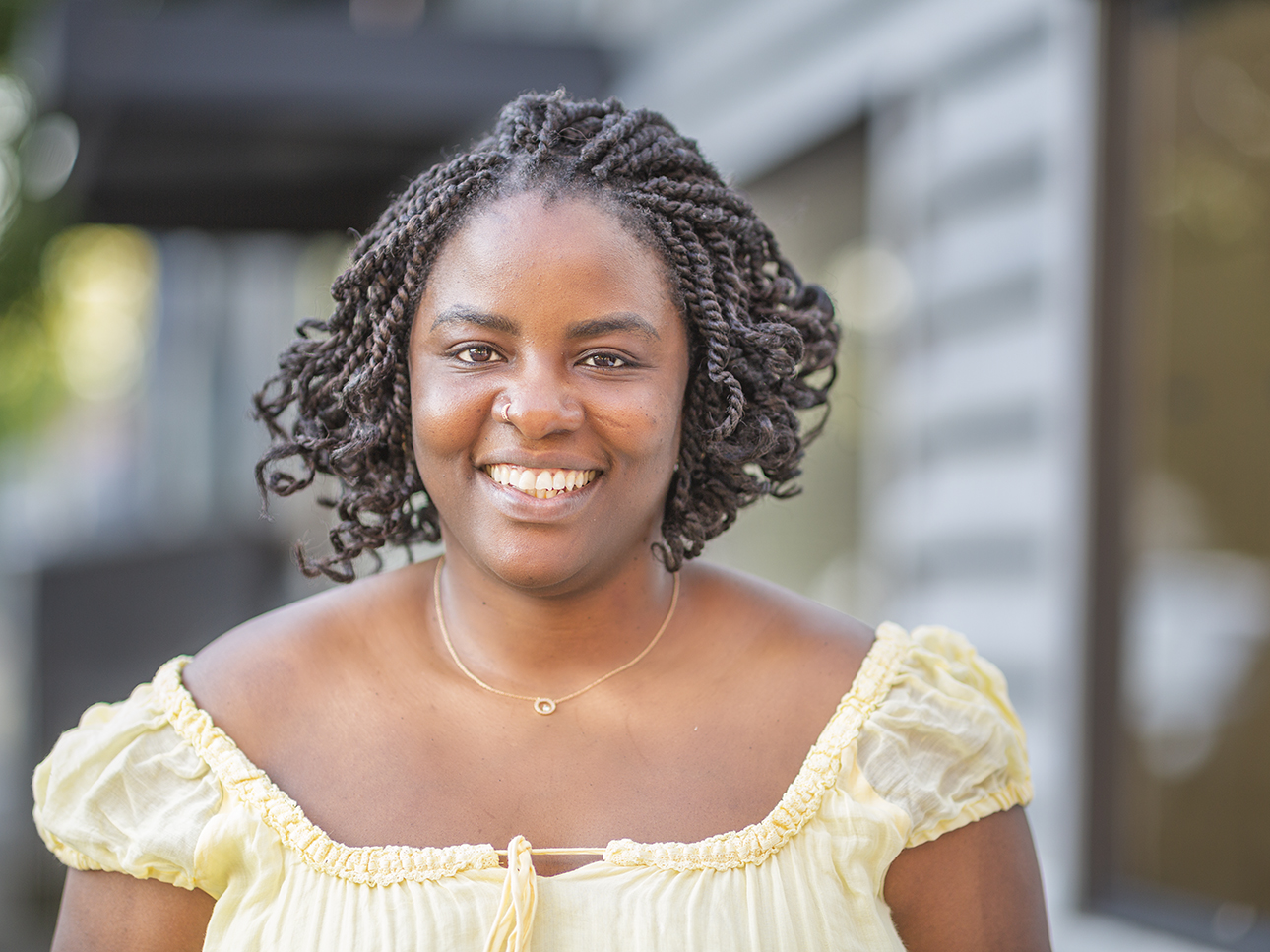Ask almost any refugee from war-torn countries how they arrived on these shores, and at this specific place, and you will inevitably hear of radical choices as well as fortuitous accidents.
Fatou Ouattara decided to leave her native Ivory Coast in 2009 during a civil war that slaughtered people from her tribe, including family members; and which made getting an education nearly impossible. Since she spoke fluent French (as well as the Bambara common to West Africa), France was a logical site for emigration. But Ouattara, then 23, wanted to learn English, so she opted instead to come to the U.S. She did her research, imagined Portland, Maine a compatible landing spot, and bought a ticket. But the ticketing did not work as planned, and by lucky error she fetched up in the Northwest, in that other and better Portland. Had she not mistaken the cities, would the future chef and owner of the West African restaurant Akadi have put plantain fried in palm oil into down East chowder? Or simmered Penobscot Bay lobsters in peanut butter stew? Our luck is that Ouattara combines alloco and mafé sauce–those Ivory Coast ingredients–with Pacific tuna and Willamette Valley wild mushrooms. West Africa meets the West Coast.
Ouattara is one of eleven siblings, and because all pitched into household chores, at an early age she learned to cook over an open fire. Aided by her many aunts and women from surrounding tribal areas, she became adept at grilling duck, lamb, and guinea fowl. But food did not seem in her future; rather she wanted to be a business person like her father, the owner of a soap factory in the Ivory Coast town of Bouake. Soon after arriving in Portland, furiously learning English and seriously ambitious in her adopted city, Ouattara studied finance at Portland State University. But cooking was in her blood, and, like so many immigrants, the food of her childhood and adolescence was both memory and sustaining continuity, even as she was rapidly becoming Americanized and a professional. So she made versions of her native cuisine in PSU’s dormitory kitchens, and accepted invitations to cook for international student events.
Meanwhile she procured a master’s degree in marketing, and worked for a translation company. But even as she put her business education into play, nostalgia for West Africa could not be repressed. Like so many newcomers who retrieve through food what they’ve lost by immigration, Ouattara was increasingly homesick for those first favors, along with a fervent desire to share them with both fellow Africans and locals who had never known such tastes. She opened a stand at a farmer’s market in Gresham serving, no doubt, the first goat stew that town had experienced. A food cart of African cuisine followed for six months. Meanwhile friends begged her to open a restaurant, and in 2017 Ouattara took the plunge.
Before opening the first version of Akadi, which means “Tasty” in Bambara, she traveled to Africa to add a repertoire of dishes from Ghana, Nigeria, Senegal, and Burkina Faso to her cache of home recipes. By then several of her brothers and sisters had moved to France, and she convinced her mother, when visiting those siblings, to bring with her boxes of Ivory Coast spices and herbs. And so Ouattara began a custom of traveling to France a half dozen times a year with empty suitcases to fill with provisions for her new restaurant. Into one suitcase go akpi seeds used to make pungent sauces; into another suitcase go peppery “grains of paradise” that import floral, jasmine, and citrus notes to many West African dishes; in go mounds of Selim or musky “negro peppers” to enhance grilled meats and Nigerian stews with suggestions of bitter cocoa; into another valise go kenkeliba leaves for earthy and mineral-rich teas; and into side pockets go bags of fefe and equisi melon seeds, indispensable for Ouattara’s demanding dishes.
Ouattara has brought together her skills as cook and business woman. Akadi is now a thriving enterprise; four years into its second incarnation the restaurant employs 28 workers, including those from Mali, Benin, Tanzania, and Togo. She sources her ingredients, hires the cooks, and trains her employees in the subtleties of and distinctions among various West African cuisines. Along the way Ouattara married George Faux from Sierra Leone, and, inspired by his wife’s descriptions of open air eating places in the Ivory Coast called “maquis,” he designed a kind of indoor garden canopy, the ceiling hanging plants transforming the industrial premises on Southeast Powell to a pastoral dining area. In the Ivory Coast those “maquis” could be places serving meals under an acacia tree, at the market, even on the road. They are the ultimate informal meeting place for food and drink, named for the word for scrub or bush, which is to say the simple rural landscape—a tradition Ouattara hopes to keep alive despite Portland’s rain necessitating the garden be indoors.
All but one of Akadi’s work force are African, though Portland being what it is, about three-quarters of its customers are white. Ouattara sees her mission as spreading an awareness of the glories of West African cooking, its aromas, flavors, and complex seasonings. She knows that the trans-Atlantic slave trade brought to the New World a distinct cuisine, and now she wants those foodways to broaden our conception of ethnic cooking.
Asked about any racist incidents she has experienced, Ouattara recounts an incident on MAX, when a man spat at her: “You disgusting Africans don’t get to sit next to me.” Can delicious food change such minds? Probably not. But she believes that our very tastes can contribute to global openness. Fatou Ouattara is a teacher as much as a representative, and just as much as she assimilated to the new place she fell into by curious chance, her goal is to share her heritage and persuade us to assimilate that culinary art into our everyday lives.

